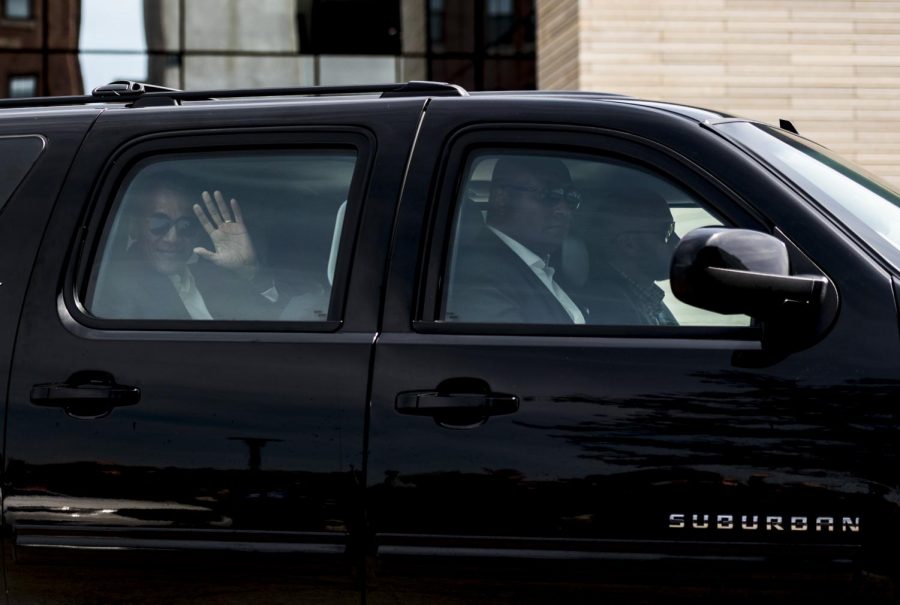Obama encourages next generation in welcomed return home
In his first public appearance since leaving the Oval Office, Barack Obama inspired the next generation in a April 24 panel discussion at the University of Chicago.
April 24, 2017
Former President Barack Obama returned to his adoptive home April 24 for his first public appearance since leaving the White House.
At the University of Chicago, where Obama previously taught constitutional law, the 44th U.S. president and former Hyde Park resident spoke to an invitation-only audience from colleges and universities across the city. In a panel discussion with college and high school students from U of C, Loyola University, Roosevelt University, the University of Illinois at Chicago and Kenwood Academy High School, Obama told them about the hardships preventing the nation from advancing from its political divisions, what he plans to do to solve them as a private citizen and what others can do to engage their community.
“Although there are all kinds of issues I care about and issues I intend to work on, the single most important thing I can do is to help in any way I can to prepare the next generation of leadership to take up the baton and to take their own crack at changing the world,” Obama said.
While the nation faces a great deal of “daunting” challenges, including economic inequality, climate change and a skewed criminal justice system, Obama said they are not insoluble. Unfortunately, issues such as partisan politics and money in politics act as barriers to solving them and they need to be broken, he added.
“When I said in 2004 [at the Democratic National Convention] that there are no red states of blue states, they’re the United States of America, that was an aspirational comment,” Obama said. “It’s one that I still believe in the sense when you talk to individuals one on one, there’s a lot more that people have in common then divides them.”
A great number of citizens have given up on the country’s political system and cause the country’s overall low voter turnout for elections, according to Obama, and it is up to the “next generation” to solve this problem. Fortunately, the next generation is “sharp, astute, tolerant and thoughtful,” he added.
However, people are less likely to be involved in their local community than they used to be, Obama said. This leads to a more individualistic society and has spilled over into our politics and empathy. Obama encouraged the panelist and audience to not continue this trend.
The speech was extremely well received by the audience, including Keeton Chamberlain. The 35-year-old community organizer said the former president’s speech was “therapeutic” given the rhetoric of his successor.
“To see him in the flesh, to hear his thoughts and to have someone coherent speaking who has an actually thought process on issues that matter and not just blanket statements [was therapeutic],” Chamberlain said.
Though Obama had a “well-deserved vacation” since Donald Trump’s January inauguration, it was encouraging to to see him return to public appearances, Chamberlain said. He thinks that Americans will look back fondly on Obama because of legislation including the Affordable Care Act and the Paris Climate Agreement.
Despite Trump trying to reverse several of Obama’s key achievements, Chamberlain said the current administration is like “amateur hour” and is not competent enough to do so, citing its inability to repeal the ACA.
“They failed [to repeal], and they’re about to fail again,” Chamberlain said.
Kevin Woo, president of the Student Government Association at Harold Washington College, said he did not expect much from the forum because he sees community organization as a “cliche.” However, he said Obama’s discussion inspired him.
“There is a division of ideas and agenda, but nobody ventured to tackle that problem,” Woo said. “Everybody took it as a constant rather than a variable. It seems that Obama wants to become a mediator for that division.”
Samer Hassan, another member of the Student Government Association at Harold Washington College, said he was agrees with Obama’s recommendation to focus on local politics and community organization to combat society’s divisions. The nation needs to turn some of its attention away from what is happening in the Washington, D.C., he added.
“We need to start working from the ground up, not from Washington, [D.C.] down,” Hassan said. “If you want to say you understand the community, then the community needs to have a say in what you are doing.”
Obama said running for elected office or casting a vote at the ballot box are not the only ways to engage and make a difference in your community. He added that he wants to work with young people to take their step forward in advancing the nation.
“[I want to] get this next generation to accelerate their move toward leadership, because if that happens, I think we’re going to be just fine,” Obama said.








